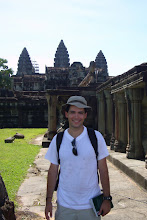Tisha B'Av is a weird holiday.
Tisha B'Av is a weird holiday normally, and I think it's even weirder in Jerusalem. Tisha B'Av is the Ninth of Av, and it is the day when the first Temple was destroyed by the Babylonians in 586 BCE, the second Temple was destroyed by the Romans in 70 CE, the Bar-Kokhba Rebellion was quashed in 135 CE, the edict for expulsion from England in 1290 was ordered, and the day the edict for expulsion from Spain in 1492 was ordered. Lots of bad things. One little day.
It's doubtful that all of these things happened on the same day (there are other tragic events in Jewish history that occurred on Tisha B'Av as well), but what the day represents, to me at least, is a day of collective Jewish mourning for all of the atrocities in our history. It's intense, to say the least. Traditionally, you're supposed to fast for the full day (it's the only other 26 hour fast apart from Yom Kippur), behave as if you're mourning (no entertainment, no washing, no study, etc) and you're supposed to read the Aicha (the book of Lamentations).
What makes it a weird holiday is few-fold. First, the "mourning" type prohibitions go out after middday, so while you "can't" study or work or sit in chairs etc before noon, in the afternoon (while you're still fasting), you can resume business as usual. Additionally, Tisha B'Av is NOT a chag. It's not a day of rest. In Jerusalem, that means the buses run, markets are open, taxis charge weekday rates, etc. Kosher restaurants are still closed though.
And then, since I'm at HUC, there's the Reform aspect. The Reform movement has, historically, had a very weird relationship with Israel/Zionism, and therefore has an even weirder relationship with Tisha B'Av. It is a holiday where we mourn the loss of Jewish sovereignty in Jerusalem, both in a political and religious sense. "Well, Jerusalem is back in Jewish hands. So what is there still to mourn?," the Reform movement asks. It’s a valid question. So while we had Tisha B’Av service Saturday night and some programming Sunday, there was also class on Sunday.
Tisha B'Av is also one of the holidays that gets a short shrift in Jewish education, because it's in late summer when schools are not in session (the exception is for camps, and there were a lot of interesting stories I heard this year of people's experiences observing and leading Tisha B'Av programs), so growing up I had zero relationship with the chag. As an adult, I've begun to create my own customs and observances, reformulating the traditional observances to fit where I am, physically and spiritually.
This year, Tisha B'Av was this past Sunday (so it started Saturday night as Shabbat went out). I fasted. Saturday night we had a service, and then a walk to the Kotel, which was awesome (if I can use that word). There were throngs and throngs of people there, huddled in little groups chanting Aicha by the Kotel. It was mostly Haredim, but there were also soldiers and secular looking Israelis and Dati-Leumi and some Christians. And as we left, there were hoards of people coming in, just waves and floods of people with strollers and children and couples and families and tourist groups. It was totally mind-blowing. The Kotel itself, well, it hasn’t changed much in 2000 years.
I didn't study - or go to class - in the morning. My feeling was class was the equivalent of work, and to do that on Tisha B’Av didn’t jive for me. I did go to the programming, which was fascinating, and the mincha service, and finished my fast. I’m still wrestling with this holiday; it’s a tough one to get a hold on. But hopefully I can find a way to figure out my own relationship to it, and then bring that into the classroom, so my kids don’t get the lack of Tisha B’Av education that I did.
Tuesday, August 12, 2008
Subscribe to:
Post Comments (Atom)

No comments:
Post a Comment